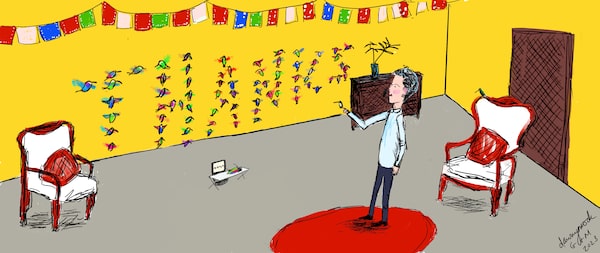Good morning, and welcome to the weekend.
Grab your cup of coffee or tea, and sit down with a selection of this week’s great reads from The Globe and Mail. In this issue, after a five-month investigation, reporters Greg Mercer and Jimmy Huang unpack the complex tale of Taiwan-based Buddhist organization Bliss and Wisdom’s purchase of land in eastern Prince Edward Island – and residents’ concern over what they see as a highly co-ordinated land grab.
“I didn’t fully appreciate how much land issues matter to Islanders on PEI,” Mercer says about reporting this story. Despite its small population, PEI is densely populated and covered in those family farms. “They really see this as their way of life, these small family farms,” he says. The Lands Protection Act was enacted in the province in the early 1980s to prevent individual landowners from dominating the island, allowing a maximum of 3,000 acres of arable land to be bought by corporations and 1,000 by individuals. But it’s estimated that more than 17,000 acres has been bought up by Bliss and Wisdom and people affiliated with the group, which is fuelled by tens of millions of dollars in international donations and led by a Chinese-Canadian woman known to adherents as Master Zhen-Ru. The island is still waiting for word on whether the government will commit to a public inquiry. In the meantime, houses and farms sit empty in a community forever changed.
Also, Adam Radwanski interviewed leaders of auto parts manufacturers in Canada on surviving – and, they hope, thriving – as the big shift to electric vehicles begins.
And, author and historian Charlotte Gray explains why Canadian non-fiction is becoming too expensive to write as the country’s publishing industry shrinks and why that’s bad for all of us.
If you’re reading this on the web, or it was forwarded to you from someone else, you can sign up for Great Reads and more than 20 other Globe newsletters on our newsletter sign-up page. If you have questions or feedback, drop us a line at greatreads@globeandmail.com.
Monks, money and the fierce debate over PEI’s scarce land
Monks at the Great Enlightenment Buddhist Institute Society's (GEBIS) campus in the community of Heatherdale, PEI on April 21, 2023.DARREN CALABRESE/The Globe and Mail
A Taiwan-based Buddhist group has, over several years, acquired parcels of land in eastern PEI from farmers and families who have been there for generations. Residents are concerned that the organization is flouting loopholes in PEI’s strict land rules to amass the real estate but the group says it’s following the rules. Greg Mercer and Jimmy Huang investigate the complicated story of money, monks and the fight for PEI’s farmland.
What the EV transition means for the heart of Canada’s auto industry
Components of electric vehicle battery trays are prepared to be welded at Magna's Heart Lake production facility, where they are currently manufacturing battery enclosures for Ford F-150s, in Brampton, Ont., Aug. 3, 2023.Christopher Katsarov/The Globe and Mail
Companies big and small in Canada’s domestic auto-parts sector are facing intense pressure to pivot, grow and fulfil the demands of their clients as the automaking industry begins its biggest shift since vehicles began rolling off assembly lines more than a century ago. Business reporter Adam Radwanski spoke to the leaders of dozens of auto-parts companies to gauge what the transition to electric vehicles means for them. For those involved in engine-making, the change will be profound; less so for companies focused on making frames and interiors. But all aspects of vehicle-making are affected by automakers’ push to make everything lighter to compensate for the high cost of battery materials.
Canadian writers can’t afford to write non-fiction anymore – and that’s a problem for all of us

Illustration by Dorothy Leung
Deeply researched non-fiction written by Canadians is becoming a rarity, these days, writes Charlotte Gray. Forty years ago, there was a thriving Canadian publishing industry, producing works by the likes of Pierre Berton, Michael Bliss, Farley Mowat, Donald Creighton and Peter Newman. Sure, their accounts of history often ignored pre-settler times, but at least they were being written, read and discussed. Now, as Canadian publishing dwindles, book advances in the tens of thousands are a thing of the past. The average advance is now $5,000 to $7,500, meaning there is much less money around to cover the costs of writing in-depth, non-subjective non-fiction.

Marcelo Puente as Don José and J’Nai Bridges as Carmen in the Canadian Opera Company’s production of Carmen, 2022.Michael Cooper
In most traditional operas, the lead female character usually gets assaulted or dies in the end. Opera companies across the country have been trying to find ways to make these plots more suited to a modern audience and more palatable to singers on stage. Intimacy co-ordinators, while now commonplace in film and theatre, are finally coming to opera to help make that the case. Michael Zarathus-Cook reports on how intimacy co-ordinators are not only making actors more comfortable, but are also helping to open new doors of artistic expression by advocating for female characters.
From Missy Elliott to Lil’ Kim, charting the iconic style of women in hip hop

Lil' Kim performs a tribute to lifetime achievement award winner Sean "Diddy" Combs at the BET Awards on Sunday, June 26, 2022, in Los Angeles.Chris Pizzello/The Associated Press
Historians point to Aug. 11, 1973 as the day hip hop was born, at a party in the Bronx. On the genre’s 50th anniversary, there are plenty of new films and other projects examining the path of women in hip hop, who had to carve out space for themselves in a distinctly macho musical genre. Elio Iannacci explores the struggles, successes and major fashion moments that solidified Queen Latifah, Missy Elliott, Lil’ Kim and the like as influencers of hip hop style for generations to come.
Analysis: Pierre Poilievre, the class tourist who didn’t read the guidebook

Conservative Leader Pierre Poilievre speaks at a news conference outside West Block on Parliament Hill in Ottawa, Aug. 1, 2023.Justin Tang/The Canadian Press
Pierre Poilievre seems to be embarking on a bout of class tourism, writes Ottawa reporter Shannon Proudfoot. From massively inflating the estimated income of a waitress in a small Ontario city, to referring to the working class as “common people,” the leader of the Conservative Party of Canada has managed to say a few out-of-touch and insulting things “as he wages his chosen game of class warfare,” she writes. He has grasped onto real frustrations but is treating them like “smoldering embers of resentment to be fanned for his own purposes.”
Opinion: Nazis filled this castle with symbols of hate. Now, those icons are finding new homes and new fans

An art display at Wewelsburg Castle in Germany uses the coloured triangles that its former Nazi occupiers used to identify prisoners.Courtesy of Marsha Lederman
Columnist Marsha Lederman had recently taken a trip to a German castle called Wewelsburg, once a gathering place for the SS. For Lederman and her sisters, the trip to the castle was a stop on a journey to understanding the trauma their families endured during the Holocaust. But to her horror, it quickly became clear that the castle was an attraction for others on a pilgrimage to pay tribute to the horrific Nazi ideologies that are rising around the world again.
Drawn from the headlines
A woman in Mexico City turns her apartment into a clinic for dozens of ailing hummingbirds — The Globe and Mail/via The Associated Press, Aug. 8, 2023 as drawn by Dawn Mockler for The Globe and Mail

Dawn Mockler for the Globe and Mail